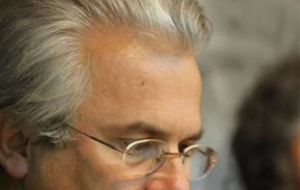MercoPress. South Atlantic News Agency
Judge Garzon barred from office for challenging Spanish 1977 amnesty law
 The Judge is also famous for trying to extradite Chilean dictator Pinochet from UK
The Judge is also famous for trying to extradite Chilean dictator Pinochet from UK The famous human rights crusader, the Spanish judge who won fame with his attempt to extradite former Chilean dictator Augusto Pinochet in the 1990s, is barred from office for eleven years for abusing judicial powers.
A Madrid Court ruled Baltasar Garzon is guilty of authorizing illegal recording of defence lawyers' conversations.
The 55-year-old lawyer faced three cases linked to his investigations into human rights abuses, corruption and other offences. Among the judges’ supporters were victims and relatives of Spain's rabidly conservative church-supported right-wing dictatorship, which lasted until the late 1970s, and a representative of an Argentine human rights group, who see Garzon as a hero.
The case against the suspended High Court judge involves allegations he illegally authorized police to record the conversations of lawyers with their clients in custody. All three cases are private prosecutions, brought by individuals and organizations rather than the state. Garzon has dismissed the accusations and Spain's public prosecutor has recommended his acquittal on all the charges.
Garzon is famed at home for leading an investigation into death squads run by the Socialist government in the 1980s in its conflict with Basque regional separatists, ETA, a probe credited with helping the centre-right defeat the left in 1996 elections.
He has also attracted critics, who have accused him of seeking the limelight with high-profile international cases involving prisoners at Guantanamo Bay and victims who disappeared during the 1970s dictatorship in Argentina.
Garzon is also accused of violating an amnesty law by ordering an investigation into the killing of tens of thousands of civilians during the four-decade dictatorship of General Francisco Franco, who died in 1975.
In 1977, the first democratic government elected after Franco's death passed the Law 46/1977, of amnesty, which exempted of responsibility to everyone who committed any offence for political reasons prior to this date. This law allowed not just the commutation of sentences of those accused to attack the dictatorship, it secured that those crimes committed during the Franco era would not be prosecuted.
Garzon's attempt to extradite Pinochet from Britain in 1998 to face charges of human rights abuses following the dictator's 1973 coup in Chile set a precedent for the principle that crimes against humanity do not prescribe and can be investigated anywhere.




Top Comments
Disclaimer & comment rulesCommenting for this story is now closed.
If you have a Facebook account, become a fan and comment on our Facebook Page!